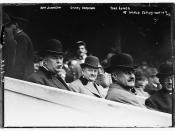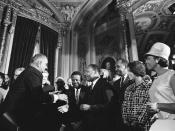The American Change
An analyse of Johnson's Inaugural Address
1. Introduction:
Lyndon B. Johnson was born on August 27, 1908, in Texas . In the 1960 presidential campaign, Johnson was elected Vice President, as John F. Kennedy's running mate. On November 22, 1963, when Kennedy was assassinated, Johnson was sworn in as President. Using skills of persuasion and calling on the legislators' respect for Kennedy, Johnson succeeded in gaining passage of the Civil Rights Act in 1964 . On May 22, 1964, he held a speech, in which he began to use the name "Great Society" to describe his reform program, and that term received even more play during the presidential campaign and after his landslide presidential victory that same year .
In his Inaugural Address Johnson used the outlined concept of the Great Society. It was his own extensive legislative program to raise the quality of American life. Congress, against muted opposition, enacted a new housing bill, a Medicare program to help provide medical care for the elders, and additional antipoverty measures.
Other legislation protected the voting rights of southern blacks, created a federal Department of Housing and Urban Development, and abolished the immigration quota system.
It is important to understand the concept of Johnson ideology and his Great Society to be able to understand his strategies in his inaugural address, and to understand what he was talking about.
In this essay I will discuss the communicative strategies and codes in the speech and show what he was talking about and tried to achieve.
2. Discussion:
To take it from the beginning: Johnson's speech was well-written and articulated. The impression Johnson projected in this speech was that of a person of intelligence and benevolence. Using this ethos so well, Johnson was naturally giving the possibility of persuading his audience,



Perfect
Your essay is informative and provocative. Well researched and thoroughly written. Excellent!
0 out of 0 people found this comment useful.